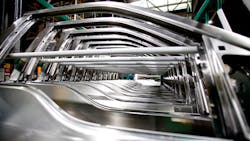Big Summer Shutdowns Loom for US Auto Plants as Sales Sputter
Auto workers may be getting some extra time off around Independence Day, but they won’t be celebrating. They’ll know it means sales are weak and that profits -- and profit-sharing checks -- could be shrinking.
Manufacturers used to shut plants for a week or two in July for maintenance and to keep inventories in check. As sales boomed in recent years, most factories cranked out cars without a break. This summer, widespread closures may be back, and for weeks longer than before. The reason: four straight months of declining sales and little expectation the trend will reverse anytime soon.
It’s probably not what President Donald Trump wants to hear. He has admonished Ford Motor Co., General Motors Co. and Toyota Motor Corp. for building factories in Mexico and demanded more U.S. jobs be created, taking credit for some new investments in the U.S. that had been long in the planning.
“You see what’s going on with the car companies,” Trump said in an interview Monday with Bloomberg News. “They’re all talking about building in the United States because of me.”
The reality isn’t so upbeat, with automakers aiming to draw down bloated inventories by ratcheting back output.
“We’re not seeing the same picture as the president,” said Michelle Krebs, a senior analyst with Cox Automotive. “We are not seeing any new plants being built in the United States or increases in production. The fact is we have passed the sales peak and we’re now seeing decreases in production.”
Too Early to Tell
None of the major automakers would discuss plans for factory intermissions this summer, saying it was too early to tell what closures might be necessary. Erich Merkle, head of U.S. sales analysis at Ford, said that with the company’s inventories at 83 days worth of vehicles, it may not need to add downtime if the market stays where it is.
Even if that happens, weeks of production suspension seem almost certain to be on tap for the industry, said Mark Wakefield, managing director and head of the automotive practice at AlixPartners. He said automakers have aggressive plans for temporarily shuttering assemblies that make slow-selling sedans and small models.
“For certain plants, we’ll see three or four summer shutdowns for the tougher-selling products,” Wakefield said. Right now, automakers “are a little less worried about inventories because they know they’ll be taking the plants down more.”
Weak Start to 2017 for Autos
The weak start to the year raised doubts about the idea that sales had just leveled off at close to historically high levels. AlixPartners forecasts they’ll fall by more than 1 million vehicles by 2019, down from its projected 17.25 million in 2017.
Last year, a record 17.6 million new vehicles sold in the U.S. In April, the annualized pace was 16.9 million -- the second month in a row that it came in under 17 million.
“People are starting to see that this is not necessarily a plateau,” Wakefield said. “It’s a meaningful reduction, and they’re starting to make plans around that.”
Reality Adjustment
At GM, retooling downtime scheduled at plants this year will reduce output by about 60,000 vehicles, Chief Financial Officer Chuck Stevens said last week. Discussing the chance that big cutbacks might be necessary, he said during a call with analysts Monday that about 30% of GM’s factory workers are ‘‘short term” and not eligible for unemployment compensation.
The six biggest automakers missed analysts’ estimates and reported U.S. sales declines in April. Ford and Honda Motor Co. suffered the steepest decreases.
Beyond possible plant shutdowns, another month of weak sales raises the prospect companies will need to boost discounts and cut output to address swelling supply on dealer lots. Ford and GM joined auto-parts and dealer stocks leading some of the S&P 500 Index’s biggest declines in Tuesday trading.
Not everyone subscribes to the notion that the industry is headed for annual sales of under 16 million over the next couple of years. The economy is strong enough to keep deliveries up, said Maryann Keller, an industry consultant in Stamford, Conn. Carmakers will simply have to adjust to the reality of the number slipping away from last year’s 17.6 million record.
One reason is that sales had until recently been roaring, so there are plenty of newer models in driveways. Another is that new cars have gotten more expensive and lenders are getting tighter with credit terms, sending more shoppers to the used-car market.
“Some people can’t get financed or it’s very expensive,” Keller said. “It’s people with prime and near prime credit that are buying new cars. That’s why we’re seeing some of the decline.”
It’s happening even as automakers boost discounts. Spending on incentives last month through April 16 reached a record for the month of $3,499, according to J.D. Power.
One silver lining: Many passenger cars are now made outside the U.S. and that’s where the big output cuts would probably take place, said Cornell University labor professor Art Wheaton.
“I think it will hit Mexico and Canada more than the U.S.,” he said. “We don’t build a lot of cars in the U.S.”
By David Welch, Keith Naughton and Jamie Butters
